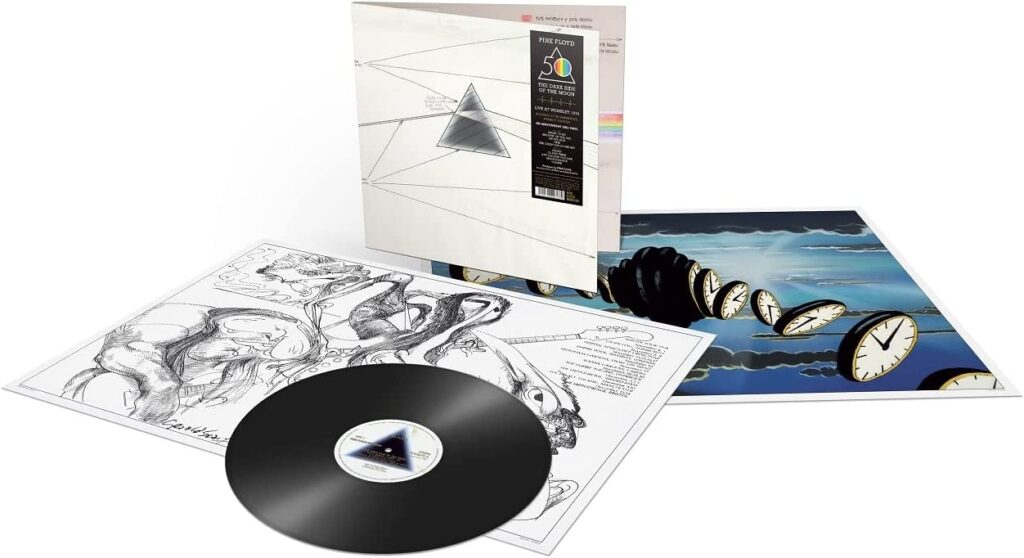Home / Pink Floyd Discography / Pink Floyd The Dark Side of the Moon Live at Wembley 1974 (2023)
“Pink Floyd The Dark Side of the Moon Live at Wembley 1974” is a live concert recording by Pink Floyd, initially recorded by BBC Radio 1 during the British Winter Tour in 1974 at the Empire Pool (now Wembley Arena), England.
This performance (not included on the release) is significant for featuring an early version of “Shine On You Crazy Diamond” and early renditions of “Sheep” and “Dogs” under the titles “Raving and Drooling” and “You’ve Got to Be Crazy,” respectively. Additionally, the concert included the entire “The Dark Side of the Moon” album and one of the final performances of “Echoes” with saxophone by Dick Parry.
The recording was not released as a standalone album until 2023. Before this, segments of the concert were included in various Pink Floyd box sets. On March 24, 2023, the performance of “The Dark Side of the Moon” was featured in the album’s 50th-anniversary box set, released on CD and vinyl, and also as a standalone album on CD and vinyl under the title “The Dark Side of the Moon Live at Wembley 1974.” This release marked the first availability of the performance on vinyl. However, tracks like “Shine On You Crazy Diamond,” “You’ve Got to Be Crazy,” “Raving and Drooling,” and “Echoes” remained exclusive to their previously mentioned box set releases.

Why weren’t the other songs from the Empire Pool recording issued?
The Pink Floyd performance at Wembley in 1974, which was later released under the title “The Dark Side of the Moon Live at Wembley 1974,”focuesd on the “Dark Side of the Moon” album, but the setlist also included other songs. Initially, parts of this concert were released in various Pink Floyd box sets, and in 2023, the specific performance of “The Dark Side of the Moon” from this concert was released as part of the album’s 50th-anniversary box set and as a standalone album.
The track listing for “The Dark Side of the Moon Live at Wembley 1974” (2023) includes the following tracks from “The Dark Side of the Moon” album:
- “Speak to Me” (extended tape)
- “Breathe”
- “On the Run”
- “Time”
- “The Great Gig in the Sky” (The LP version fades out)
- “Money” (Truncated on LP)
- “Us and Them”
- “Any Colour You Like” (Truncated on LP)
- “Brain Damage”
- “Eclipse” (Truncated on LP)
Additionally, early versions of songs such as “Shine On You Crazy Diamond,” “Raving and Drooling” (early version of “Sheep”), and “You’ve Got to Be Crazy” (early version of “Dogs”) were performed during the concert but were not included in the 2023 standalone release of “The Dark Side of the Moon Live at Wembley 1974.” These tracks remain exclusive to their previously mentioned box set releases
Pink Floyd Band Members
The Pink Floyd live album “The Dark Side of the Moon Live at Wembley 1974” features the core members of Pink Floyd during that period. These members were:
- David Gilmour – Gilmour played guitar and was one of the vocalists. He joined the band in 1968 and became a prominent part of Pink Floyd’s sound and success, contributing significantly to their music and vocals.
- Roger Waters – Waters was the bassist and another vocalist for the band. He was also a key songwriter and conceptual leader, especially for albums like “The Dark Side of the Moon” and later works.
- Richard Wright – Wright played keyboards and provided backing vocals. His contributions on the keyboards were a significant part of the Pink Floyd sound, adding atmospheric and textural elements to their music.
- Nick Mason – Mason was the drummer, providing the rhythmic foundation for the band’s music. His style was noted for its laid-back, spacious, and innovative approach.
In addition to these core members, the live performance likely included additional touring musicians for certain parts, such as backing vocals or additional instrumentation. For instance, Dick Parry often collaborated with Pink Floyd as a saxophonist around this time, including on “The Dark Side of the Moon” studio album.
Syd Barrett, one of the founding members, was not part of this live performance as he had left the band several years earlier, in 1968. Barrett’s departure was primarily due to his deteriorating mental health, which was, in part, attributed to his use of psychedelic drugs. After Barrett’s departure, David Gilmour became a full-time member of the band, and the group continued to evolve musically.
